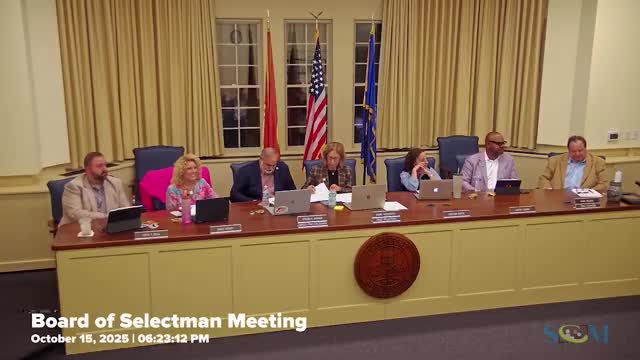Simsbury Selectmen endorse sustainability committee energy plan, require financial and prioritization reviews
Get AI-powered insights, summaries, and transcripts
Subscribe
Summary
On Oct. 15, 2025, the Simsbury Board of Selectmen voted to endorse the Sustainability Committee’s “Part 1: Energy” plan, supporting goals for increased efficiency, solar and electric-vehicle planning while specifying that no projects proceed without financial viability and prioritization reviews.
On Oct. 15, 2025, the Simsbury Board of Selectmen voted to endorse the Sustainability Committee’s Part 1: Energy plan, a nonbinding roadmap that lays out goals for energy efficiency, school and municipal solar, battery storage and study of electric-vehicle charging and electrification of heating systems. The board’s endorsement included a proviso that “no projects will proceed without appropriate reviews” of financial viability, staffing and prioritization.
The plan, presented to the board by a Sustainability Committee representative, frames energy measures as a way to lower long-term operating costs, increase resilience during outages, and reduce greenhouse-gas emissions. The presenter said the committee is asking for the board’s endorsement and highlighted state and nonprofit financing options that could be used to implement projects with little or no up-front town cost. “We are not asking for mandates, and we are certainly not asking for funds to be committed tonight,” the presenter told the board.
Why it matters: The committee recommended goals for municipal and school buildings that include benchmarking, pursuing energy audits, and exploring solar and battery projects for schools and town facilities through programs such as Connecticut Green Bank’s Solar MAP+ program. Committee members told the board the state-level financing and tax incentives can lower up-front costs and that a successful project could yield ongoing savings for taxpayers.
Board discussion centered on the timing and finance windows for federal and state incentives, the town’s limited flat roof inventory for solar, and the need to prioritize projects within the existing capital planning process. Selectmen and staff said the recommendation is intended to be a planning and advisory document rather than an immediate authorization of any capital spending.
Selectman Kevin Veal, the board liaison to the committee, urged the board to treat the plan as part of long-term goal setting and added that hybrid and electrified vehicles already show operational savings in some departments. Town Manager Mark Scully, who spoke in support of clarifying review steps before any commitments, said the effort would add “a little bit of gravitas” to the committee’s work while reiterating that implementation would require later financial analysis and staff resources.
Public commenters at the start of the meeting broadly supported the sustainability recommendations. Susan Van Cleef, a resident and former member of the town’s earlier clean-energy task force, urged the board to adopt measures that “reduce carbon dioxide emissions to mitigate the effects of climate change” and to include mitigation goals in upcoming biennial priorities. Another resident, Susan Messino, urged care in siting any projects proposed for open space and reiterated a preference for using roofs and parking lots before taking additional town land.
The board approved a motion to endorse the Sustainability Committee’s Part 1: Energy plan as submitted, with the understanding that no projects will proceed until appropriate financial reviews, prioritization and staffing confirmations occur. The motion did not bind the board to any specific capital expenditure and the presenter said individual projects would come back for additional review and approval if recommended.
Looking ahead: Selectmen said the endorsement should inform goal-setting for the next biennium and should be considered alongside other capital priorities during the town’s budget process. Committee members and staff said they will continue coordination with the Board of Education and the Connecticut Green Bank to scope potential school solar projects and other pilot efforts.
